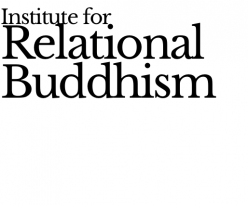Relational Buddhism envisions Buddhist Psychology as a meta-view: mind is not gridlocked under-the-skin-in-the-skull-behind-the-eyeballs-in-between-the-ears but spaced in people’s interactivity; thus ‘we can’t share brain, but we can’t but share mind’…
A meta-view of the mind, Buddhist Psychology strives to be a member of academia by taking into account and applying the findings of mainstream social, clinical and neuro-psychology and by including the practice of Cognitive-Behaviour Therapy…
Experiencing (action/emotion/cognition) is not prior to relational life but created, fashioned and sustained within relationship, inseparable from others and the world, and only meaningful in the interpersonal context and milieu where it occurs…
All that is observed in science (and noted in mindfulness) are conceptualizations which are social constructions shaped as covert self-dialogue with interpersonal meaning as we are born into a web of embodied speech in Dependent Origination…
Through parental lustful (and loving) intercourse (kamadhatu), we came about in an ocean of relationships and step into an interhumane web of interconnectedness and interdependency with sensing-emoting/thinking-talking capabilities…
Speech gets form by the syllable during meaning-making exchange (rupadathu) and as ‘languaging’ progresses, formless thoughts (arupadathu) constitute fickle mind and self-organize “independent self”, an illusory provision…
Living in an ocean of relationships from the cradle to the grave, it is pivotal to soak views and speech in vernacular reflecting interpersonal significance of binding ‘we’ and loving kindness to promote relational harmony and personal happiness…
My “independent self” is a provisional reality which is illusory: self is an illusion, unless we are able to envision interdependency, i.e. to view our ‘selves’ as inseparable and ‘spaced-in-between-people-embedded-in-culture’…
If self or soul and autonomous mind are fictions (though functional as index), singing or dancing alone, dreaming intimately, or retreating solitarily in a cave is social expression tied to relational meaning; thus solipsism is discarded as delusionary…
In effect, we are “inter-mind” or “relational inter-being” and the individual is the intersection of multiple relationships of provisional/conventional selves: capacities/potentials, differences/contradictions and agreements or harmonies…
Intentional or premeditated action (karma) could move body/speech/mind and result in psychological malaise (dukkha) regarding birth, aging, illness, death (discord with loved ones, ties with unloved ones and social failure)…
Emotions are viewed as “relational affect”, i.e. relational performances and affective scenarios expressing socio-cultural meaning around greed (resulting in financial crises) and hatred (resulting in terrorism), still actual today…
Greed and hatred conceal primary emotions: greed hides anxiety/fear re death of shared love (future) and sadness/grief re loss of joy-happiness (past) while hatred hides anger/aggression due to other-hate and depression/self-hate by self-blame…
Being aware and in search for awakened mind, we encounter the smallest unit of experience (dharma) and habits to crave for, grasp at, and cling to sensing-feeling (vedana), thinking-emoting (samjna), intending-acting (samskara)…
These body/speech/mind modalities or skandhas, arising and subsiding in Dependent Origination, correspond with the micro-analytic building blocks of cognitive-behaviour psychology: Behaviour, Affect, Sensation, Imagery, Cognition, Interrelationships (our BASIC-I)…
If you are seeking online therapy please visit: https://www.betterhelp.com/

